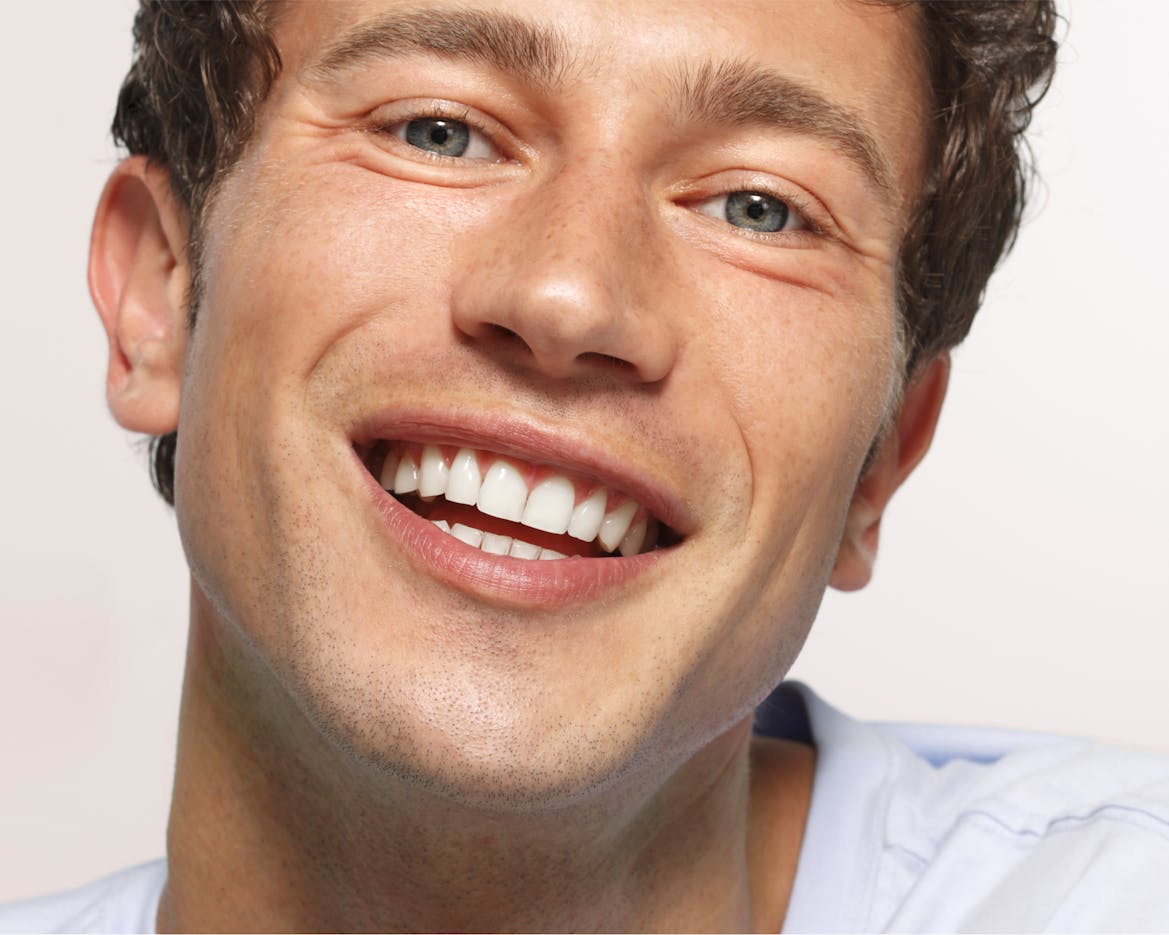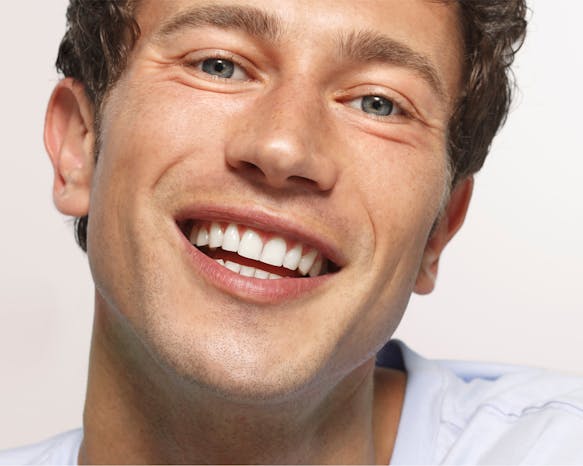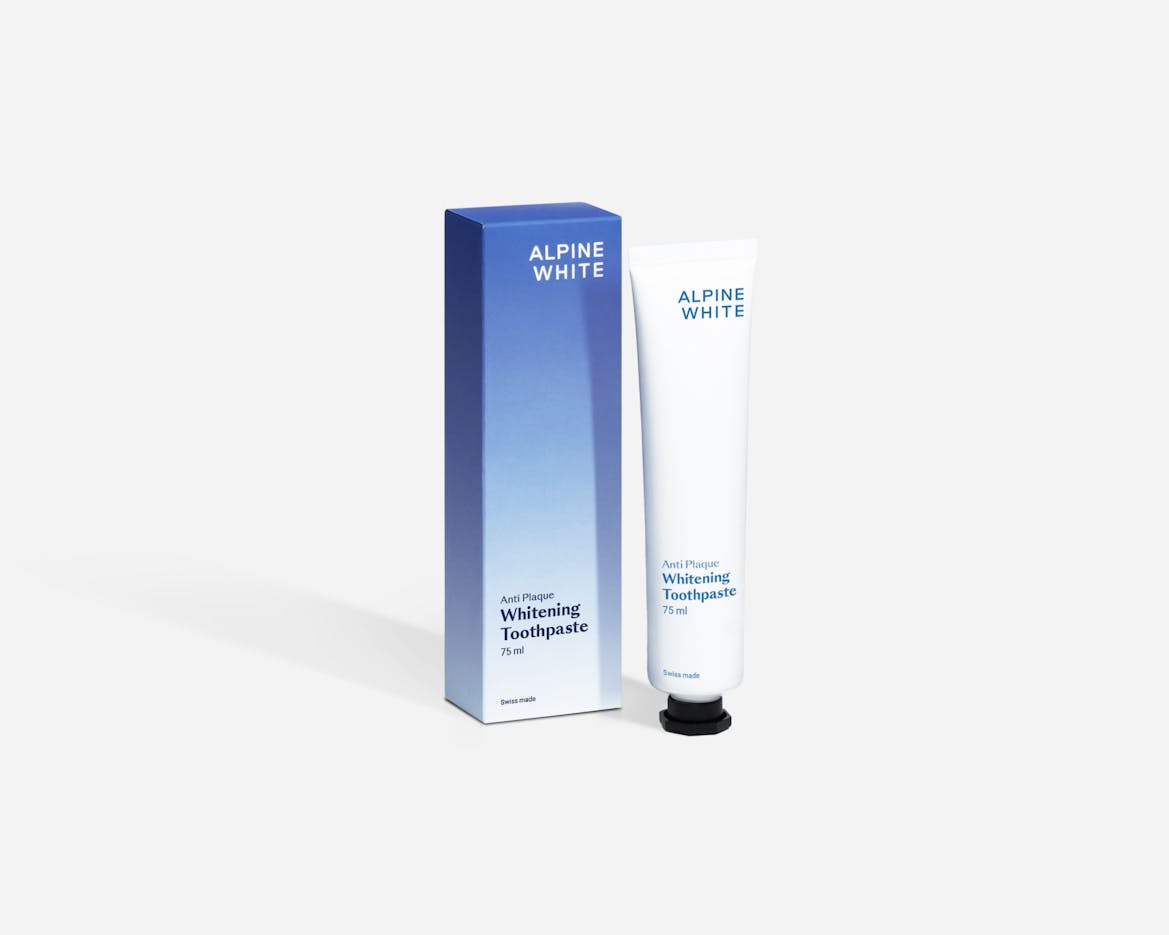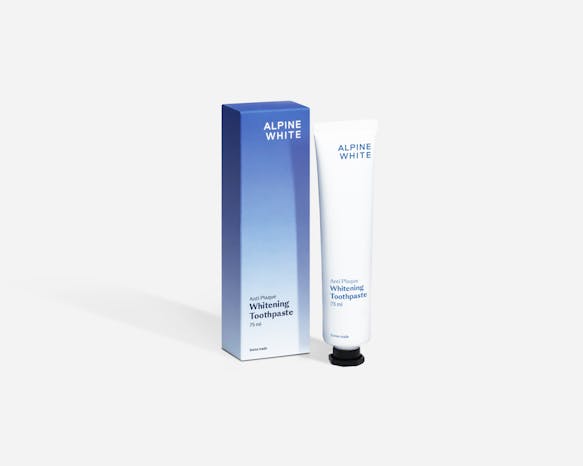The black dot on the tooth: a sign of alarm?
Have you ever discovered a black spot on your tooth and wondered what it could mean? In this blog post, you'll learn all about black spots on teeth, their causes and how you can treat them effectively.



What does a black dot on the tooth mean?
A black spot on the tooth, also known as black discolouration, can have various causes in dentistry. This discolouration is not only a cosmetic problem but can also be an indication of deeper dental problems. In some cases, a black discolouration contrasts with a white spot on the tooth, which is often a sign that the enamel is beginning to demineralise. While a white spot may indicate early caries development, a black spot can often indicate a more advanced form of caries where the enamel is already more severely damaged. However, it is important to understand that not every dark spot on the teeth is an alarm signal for caries. In many cases, such dark discolouration is purely cosmetic and does not reflect any underlying dental problems.
In dentistry, it is therefore important to recognise and treat such changes at an early stage in order to prevent further damage and maintain the health of the teeth.
Causes of black spots on the teeth
There are various causes for this discolouration, which can range from harmless to serious dental problems.
Tartar
This hardened plaque often forms at the gum line and can lead to discolouration. Tartar forms when plaque that is not removed regularly mineralises. The molars are particularly susceptible to this as they are more difficult to clean. Tartar can not only lead to black or brown stains, but can also irritate the gums and contribute to further dental problems.
Tooth discolouration
External discolouration is often caused by the consumption of food and drinks such as coffee, tea or red wine. These substances contain strong pigments that are deposited on the tooth surface and can change the tooth colour. Smoking is also a common cause of discoloured teeth.
Fluoride
Too much fluoride, known as fluorosis, can cause white or dark spots on the teeth. This is more common in children whose baby teeth are developing and can affect the permanent teeth. Although fluoride is important for dental health, too much can lead to these cosmetic changes.
Black Stain
Paradoxically, this particular type of black discolouration often occurs in people with very good oral hygiene. It is a harmless form of discolouration caused by certain types of bacteria. However, this black spot can be aesthetically disturbing.
Fissures
Pits and grooves in the teeth, especially in the molars, can trap food particles and bacteria, which can lead to black or brown stains. These depressions, known as fissures, are natural structures on the chewing surface of the molars. They can be very narrow and deep, making them ideal places for food debris and bacteria to accumulate.
Fissures are of particular importance in dentistry as they are often difficult to clean. Even thorough brushing can sometimes fail to remove all food debris and bacteria from these narrow fissures. This can lead to tooth decay, especially if the fissures are deep and the toothbrush does not reach all areas.


Regular professional dental cleaning is essential for a healthy mouth and beautiful teeth. Our specialized staff identifies signs of cavities early and prevents them.
- Personalised treatment
- Gum check & caries control
- Painless cleaning with AIRFLOW
Prevention and treatment options
In this section, we explain how you can protect your teeth from black spots.
Brush your teeth regularly
We recommend that you brush your teeth at least twice a day to effectively remove plaque and bacteria. Plaque is a sticky layer of bacteria and food debris that continuously forms on the teeth.
When brushing your teeth, make sure that you:
- Choose a toothbrush with soft bristles as they are gentle on the gums and tooth enamel. Hard bristles can wear away the enamel and irritate the gums.
- Hold the toothbrush at a 45-degree angle to your gums and brush in gentle, circular motions.
- Brush your teeth for at least two minutes to ensure that all tooth surfaces are thoroughly cleaned.
Dental floss and mouthwashes
These help to clean the areas between the teeth and under the gum line where bacteria can accumulate. Thorough cleaning with dental floss is an essential step in comprehensive oral hygiene.
Professional teeth cleaning
Professional dental hygiene plays an important role in the prevention and treatment of black spots on the teeth. Professional dental cleaning removes plaque and tartar much more effectively than normal brushing at home. This is particularly important as black spots on the teeth are often caused by the accumulation of plaque and the activity of certain types of bacteria. Thorough cleaning can remove these deposits and reduce the risk of black spots forming. You don't need to visit a dental practice for dental hygiene, simply visit one of our ALPINE WHITE Studios.
Nutrition
Avoid too many sugary foods and drinks to prevent tooth decay. A balanced diet not only contributes to the health of your teeth, but also to your general well-being.
Toothpaste containing fluoride
Our ALPINE WHITE Whitening Toothpastes with fluoride are an excellent choice for strengthening tooth enamel and preventing tooth decay. They not only offer protection, but also a bright white smile. Our ALPINE WHITE Whitening Toothpastes have been specially developed to gently whiten and protect your teeth at the same time. Our variants - Whitening Toothpaste Anti Plaque, Whitening Toothpaste Sensitivity Relief and Whitening Toothpaste Extra White.


Your solution for stubborn plaque. Whitening Toothpaste Anti Plaque is designed to remove plaque and whiten teeth at the same time. For daily gentle dental and oral hygiene.
- Removes stubborn stains and tartar
- Based on our clinically tested Whitening formulation
- Remineralizes the enamel and relieves existing tooth sensitivity
- Antioxidants for healthy gums
- ormulated and produced in Switzerland
When should you visit our ALPINE WHITE Studio?
If you discover a black spot on your tooth, it is advisable to make an appointment at one of our ALPINE WHITE Studios. Our Studios are staffed by experienced dental hygienists who can carefully and expertly assess whether the black spot is caries or just a harmless discolouration. They not only provide a professional diagnosis, but also initiate the appropriate treatment to optimise your dental health.
For those who long for a radiant smile and want to effectively remove discolouration, our Studios offer a particularly tooth-friendly bleaching treatment. This procedure is free of peroxides, which minimises the risk of toothache or other discomfort. With our gentle bleaching, you can look forward to a radiant white smile without compromising the health of your teeth.


Gently achieve whiter teeth with our pain-free in-office bleaching. Carried out by our specialised dental staff.
- Naturally white teeth
- Gentle, soft and without peroxides
- Easy to book online
Home remedies: Are they an option?
There are numerous home remedies circulating in the world of dental care that promise to effectively remove tooth discolouration. Many home remedies are popular due to their easy availability and supposedly natural ingredients. However, caution is advised as not all of these remedies are safe for your teeth.
Some home remedies can actually lead to a slight whitening of the teeth. For example, baking soda has abrasive properties that can help remove superficial stains. Similarly, coconut oil can help remove bacteria from the mouth through the technique of oil pulling, indirectly whitening the teeth.
However, these methods also harbour risks. Abrasive substances such as baking soda can erode tooth enamel if used frequently. Enamel is the hard, outer layer of your teeth that protects them from decay and other damage. Once damaged, the enamel cannot be restored, which can lead to increased sensitivity and further dental problems. Acidic products such as apple cider vinegar can also attack the enamel and lead to erosion.
It can be said that although some home remedies can provide short-term results, they are often not without risks. The best strategy for a healthy, radiant smile is good daily oral hygiene and regular visits to our ALPINE WHITE Studio.


Not sure about the health of your mouth? Thanks to our innovative intra-oral camera, we can give you a detailed overview and offer you the best possible individual routine.
- We check your oral health and hygiene
- Checking your teeth for cavities
- Composition of an individual routine
Final thoughts
A black spot on the tooth is not always a reason to panic, but it should not be ignored. Good oral hygiene, regular dental hygiene visits and a balanced diet are your best weapons in the fight against cavities and other dental problems. Remember that the health of your teeth is an important part of your overall health.
We hope this blog post has helped you learn more about black spots on teeth and how you can treat them.

